|

|
 |
|
Last Updated: Feb 13, 2017 - 1:45:37 AM |
BAMSI’s Women in Agriculture - Erin Cash; Aquaponics Shade House set to bring in millions of dollars in revenue
By BAMSI Bahamas
Oct 29, 2015 - 10:54:30 AM
|
Email this article
Mobile friendly page
|
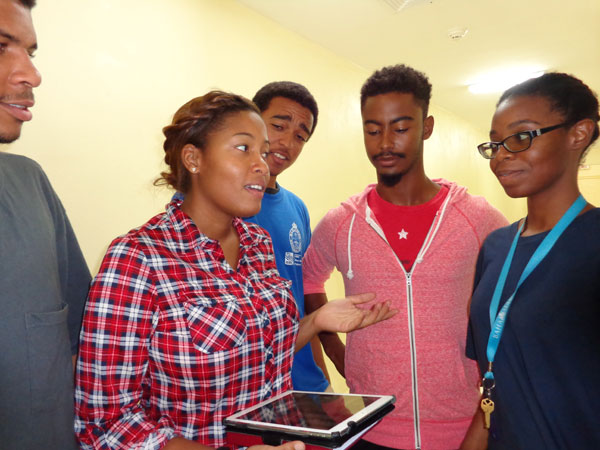
BAMSI offers students smaller classes and the opportunity to get greater support from their lecturers
|
Women in Agriculture -- Combining passion, brilliance and a strong work ethic
THE United Nations’ Food and Agriculture Organization (FAO) recently released a statement that said to improve the social and economic status of women countries need to recognize the vital role they play in the [rural] economy. While this points primarily to work being done at the subsistence level, women proficient in the field of agriculture or marine science, like Erin Cash, the Bahamas Agriculture and Marine Science Institute’s (BAMSI) Assistant Farm Manager, Marine Resources and Development, who advance a superior level of technical skill and expertise - serve a crucial function in this nation’s ability to establish new streams of revenue for future economic growth and development. The work they are able to accomplish is a critical ingredient in efforts being made by the Government to build initiatives that support food sustainability and reinforce food security measures.
Ms. Cash, like many of the talented young women emerging in science-related fields in the country, is positioned as an agent of change and also serves as a measure of progress that an educated mind, coupled with a track record of accomplishments and a fearless drive towards excellence, is sufficient to open doors to the top. She brings to the table a Master’s Degree in Aquaculture and Fisheries Management from Auburn University and a depth of professional experience that belies her youth. She stands as an essential component of the Institute’s Marine Science Department that is charged with developing critical and cost effective measures for growing food sources in an aquatic environment.
Hired in 2014 to develop BAMSI’s Aquaculture programme, which is the growing of fish or aquatic plants in a controlled, water-based environment such as ponds, tanks, raceways, cages or pens, Ms Cash explained that the programme, which is still in its infancy, will consist of the production of cobia and shrimp in a caged environment both on and offshore.
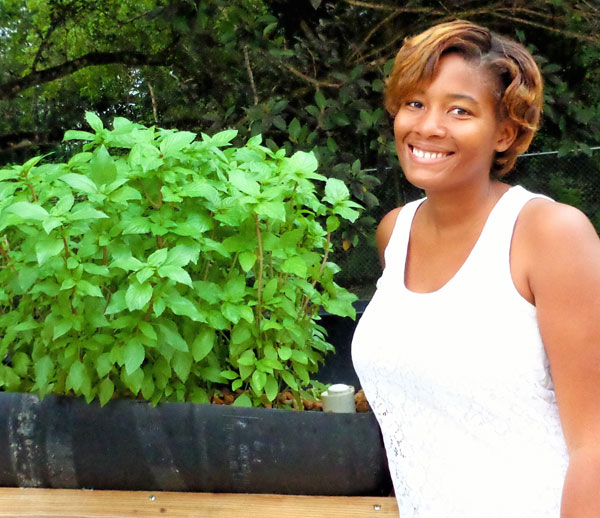
Erin Cash, Assistant Farm Manager Aquaculture
|
Tied in with her role as Farm Manager, Ms Cash also lecturers for the Institute. “Seeing our facilities come to their full potential and imparting knowledge I learned while I was away to students who don’t have that opportunity to go abroad is what’s important to me,” she acknowledged. Under her guidance students will play a role in the maintenance, feeding and fish husbandry of the cobia and are expected to have a similar experience with the shrimp culture which would be developed inland in a bio secure facility. Forward looking BAMSI proposes to expand its research portfolio to include growing salt water favourites grouper and snapper. The aim of the programme is to “train future entrepreneurs how to recreate our systems for their own companies,” she noted, adding that “its primary purpose is for demonstration, though some of the products will be available for national consumption.”
Asked how she initially got involved in the field of aquaculture, Ms Cash said it was the result of a 10th grade biology project at her high school, St Augustine’s College. The students were required to present on a species and Ms Cash selected the queen conch. “In researching for the class I decided I needed to learn how to grow conch because we were going to run out of it.” As it turns out Ms. Cash was the only person in a class of 150 to enter the field of agriculture.
Not just a small field however, agriculture and the sub-section of aquaculture are male dominated fields also, but in the safety of the university culture at Auburn where youth is expected, celebrated even and real attempts are made at neutralizing the issue of gender – Ms Cash could focus on the business of learning and developing her skills free of question.
Now compare that climate with her experience at a small scale aquaponics facility on one of this nation’s Family Islands. Here the questions would come: Can she wield the nail gun, lift the wood, and carry the materials used to construct the wooden frame that surround the aquaponics fish tank? Is it possible that those female arms could lift that 40 pound bag of ornamental rocks that would sit at the bottom of said tank? Does she really understand how to connect the pipes to the water pump to ensure the fish in said tank remain in a water-based environment? As former vice president and president of Auburn’s American Fisheries Society Chapter, Ms Cash says yes, yes she can and yes she does understand.
This would be her first experience with gender bias. Here, none of the men wanted her to do anything in terms of construction “to the point where they told me to just go sit in the shade, because that’s what women were supposed to do. Even though I went to school in the Southern United States I didn’t really feel the strength of the ‘old boys club’ until I came back home. This was the first time my gender had ever hindered me from doing anything”.
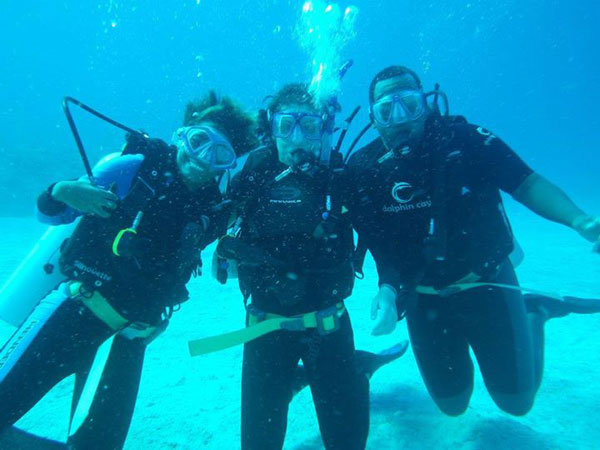
Learning how to scuba dive is an important part of becoming a marine scientist. Ms.Cash is pictured to the far left with fellow classmates
|
Once people get to know her however, see her work ethic, witness her strength in the field and understand that she has mastered both the theoretical and practical aspects of production, they back away from any preconceived notions they may have of what women can do.
In spite of existing in an environment where her ability to perform is calculated using an equation that factors in her gender and age, Ms Cash is passionate about her work and chosen field because it provides the opportunity to change lives in a manner that is both worthwhile and tangible.
“Other than winning the lottery, my goal is to help other people establish aquaculture facilities. I like being able to teach someone and then they take that knowledge and build on it. My school did a lot of [charitable work] in Uganda and I’ve always thought that was valiant – they took their technology and helped people help themselves with things they already had. My goal is to do the same, and not just here [in Andros].
“I want to continue to learn more myself in this field and either extend a hand where it’s needed or just be available for opportunities. BAMSI wants the Bahamas to be self-sustaining so expanding this knowledge to our archipelago will help with our food dependence issues as well as sustaining our environment. There is less pressure on natural fish stocks [when people] learn how to grow them or [we can] teach people how to grow them.”
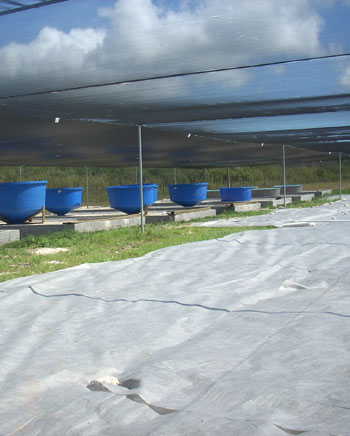
Aquaponic tanks
|
BAMSI’s Aquaponics Shade House set to bring in millions of dollars in revenue.
AN estimated $1.4 million is expected to be derived from the ramp up in production at the Bahamas Agriculture and Marine Science Institute’s (BAMSI) shade house facility based on the harvesting of some 700,000 heads of lettuce and 8,000 pounds of organic fish a year.
Dr Vallierre Deleveaux, director of Marine Resources and Development, said once the infrastructure was put in place the bio-secure aquaponics facility would hold six to twelve tanks ranging in size from 500 to 950 gallons, and could easily produce over a million dollars a year in product sales. BAMSI officials are also considering expansion into other produce, such as okra, tomato and melon.
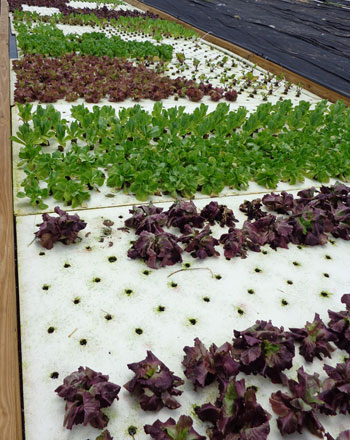
BAMSI grows a variety of lettuce and leafy greens including bibb butter and red lettuce along with basil
|
“We want to guarantee a wholesome, nutritious product for the Bahamian people. If we get all tanks operational that’s 8000 pounds of fish from the demonstration tanks, but the vegetables are the main crop – that’s 700,000 heads of lettuce a year. That’s an estimated $1.4 million derived from demonstration unit and leafy greens. This system can produce over a million dollars a year, but is really small compared to the truly commercial systems which ramp up the density, they are easily $4 million a year.”
Part of the goal in achieving this plan however, is changing the modality of the way Bahamians purchase fish. Instead of going to the dock and the fish house, consumers would view the purchase of fish and other seafood items as part of their regular routine when making their weekly or bi-weekly visit to the grocery store.
“We want to put it in a Super Value – but that does call for changing behaviour. You can buy imported tilapia on average at $7 to $14 per pound. BAMSI is likely to sell it at a significantly lower price than currently available imported price. Our biggest cost is feed, and really the money comes from vegetables, the fish are just a secondary product – a necessary secondary product.”
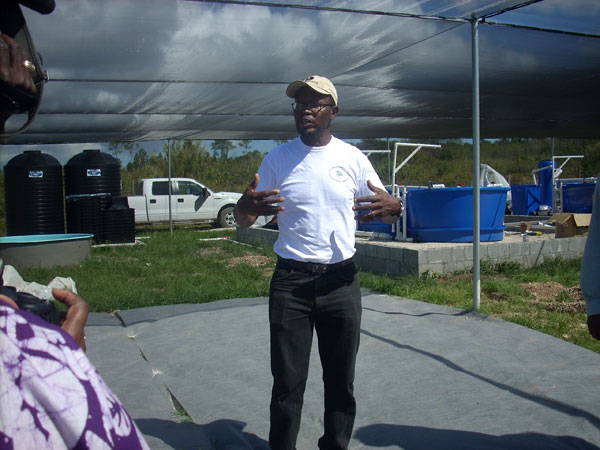
Dr.Deleveaux addresses the media during a recent tour led by Minister of Agriculture Alfred Gray
|
Dr Deleveaux, who also serves as the Deputy Executive Director for BAMSI, said the whole idea of establishing a centre that utilizes modern agriculture systems such as aquaponics, hydroponics and aquaculture started with the question; how does the government achieve its principal mandate of ensuring food security and increasing food sustainability for the country?
With the marine science component, BAMSI is able to invest in and propagate modern methods of growing, methods that require significantly less water, space and time to achieve maximum yield, to satisfy the government’s mandate of establishing an acceptable level of food security and also turning to more sustainable means of food production.
“What we are doing is very efficient – it uses very little water because it is a recirculating system, which consumes less than a tenth of the water used in regular systems,” Dr Deleveaux said. These new methodologies also support fast rates of growth, especially in leafy vegetable such as lettuces, arugula, kale, and Swiss chard.”
Under conditions where seeds are put in soil, harvesting usually takes place within two to three months. Using an aquatic-based system harvesting can occur in as little as 30 to 40 days. One of the reasons for this faster growth rate is the water allows energy
saving nutrients to come to the plant roots as opposed to roots having to search for nutrients in the soil.
Soil-based plants also spend more energy investing in stronger support systems, which means that stems typically need to be stronger in soil conditions. In hydroponics, for example, not as much energy needs to be diverted into building strong stems.
Using the aquaponics method (where plants and fish exist in the same controlled, recirculating system and form a symbiotic relationship) is a good way to get quick production, Dr Deleveaux pointed out. “You get two crops for the price of one. It’s synergistic, the waste from one benefits the other, the plants act as bio filter before water is returned to the fish.”
BAMSI currently has a backyard aquaponics demonstration system used for teaching purposes and a small scale shade house (similar in concept to a green house, the shade house refers to a cloth or netting type material that covers the area where the plants are, shielding them from direct sunlight and other elements) hydroponics production unit that when at optimal capacity will support a commercial operation.
Overseen by the marine science team, Assistant Farm Manager (Aquaculture) Erin Cash and Assistant Farm Manager (Aquaponics) Cameron Lightbourne, the hydroponics unit is currently growing four different varieties of lettuce: romaine, butter, bibb and red, as well as basil and mint. The plants grow on floating rafts placed in raceways, which are rectangular shaped boxes of sort - similar in shape to a long stretch of road – filled with water.
“Right now we have one raceway operational and we’re using it to feed the school. It can meet the needs of the Institute [for] salads, vegetables, that’s 60 people, three meals a day, the target was to meet that need and we can easily meet that need. The [raceway] holds 40 rafts and each raft has two hundred plants, but I intend to reduce that number to 120, right now it’s too dense.”
According to Dr Deleveaux, even as the hydroponics unit ramps up its operations and moves into the commercial stage – with the addition of eleven raceways -production will be driven based on demand. Consumers, such as hotels, restaurants, grocery retailers and wholesalers will be able to place orders and within 30 to 40 days BAMSI can provide fresh, quality produce at a competitive cost.
In addition to expanding the hydroponics unit into a thriving commercial entity, BAMSI is also expected to begin large scale operations for both its aquaponics and aquaculture divisions. Along with the commercial enterprise, a tutorial facility will be constructed for the students, providing them with the opportunity to gain practical knowledge of how to successfully operate a controlled, recirculating system.
“They will be based at the [demonstration shade house] with their own tanks and raceways, which they will construct and manage themselves. There will be four shade houses in total, the three additional ones will be for commercial production.
“The goal is to supply the market to meet the needs of the country. We are also looking to encourage entrepreneurship. We want our students, and even members of the public who can take short courses and get hands on experience here, to go out and reproduce the systems we’ve shown them. That’s why we have the variety of systems – from backyard and community size to commercial aquaponics systems – at BAMSI.”

© Copyright 2015 by thebahamasweekly.com
Top of Page
|
|
 |

|
